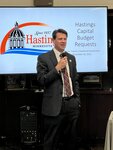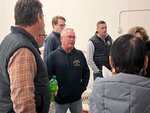Complete with a welcome from the Hastings High School band and popcorn and snacks, the City of Hastings pulled out all stops to get the message of vital community needs across to the Minnesota State …
This item is available in full to subscribers.
To continue reading, you will need to either log in, using the login form, below, or purchase a new subscription.
If you are a current print subscriber, you can set up a free website account and connect your subscription to it by clicking here.
Otherwise, click here to view your options for subscribing.
Please log in to continue |






Complete with a welcome from the Hastings High School band and popcorn and snacks, the City of Hastings pulled out all stops to get the message of vital community needs across to the Minnesota State Senate’s Capital Investment Committee on Thursday.
Committee members arrived by coach bus with Hastings as one of about 15 stops for the day. They had three scheduled after Hastings, ending the day at the Stillwater Prison. With that ambitious schedule, they were able to recharge in Hastings and hear about the community’s request for financial help in the 2024 bonding bill.
The event was held at the Hastings Civic Ice Arena, and the city had plenty of support, with department heads on hand and just about the complete city council, as well as local State Sen. Judy Seeberger of Cottage Grove and State House Rep. Shane Hudella of Hastings, Dakota County Commissioner Mike Slavik and Hastings School Board Director Mark Zuzek. After City Administrator Dan Wietecha introduced the city projects, the committee toured the ice arena and took a group picture in the west rink. They then were invited to visit tables set up for each project staffed by the city, the Minnesota Department of Transportation and Minnesota Pollution Control.
The City of Hastings has submitted four capital improvement project funding requests as part of a state bonding bill. Project requests include funding for the Hastings Civic Arena refrigeration and roof, PFAS treatment for safe drinking water, Highway 61Vermillion Street reconstruction, and the Historic Courthouse (HVAC and Dome work at City Hall).
The city is hoping for half of the funding for a $4.5 million ice arena project that includes a new roof with solar panels on the west rink and an updated ammonia based refrigeration system to replace the outdated system that uses R22 refrigerant. Use of R22 is being phased out because of its effect on the ozone layer.
The solar panels will help provide electricity used in the ice arena.
Perhaps the project that had the attention most of senators was the city plan to build three treatment plants in an effort to fight the PFAS forever chemicals.
It comes with a price north of $69 million with another $30 million to operate the treatment systems over the next 30 years.
The city plans to build a treatment plant a year over the next three years to tie in with city wells and the Hastings Veterans Home.
City Public Works Director /Engineer Ryan Stempski and Kirk Koudelka of the Minnesota Pollution Control Agency huddled with committee chair Pappas and other senators for about a half hour.
Also on the city list is help paying for the rebuild of Hwy. 61 planned for 2026-27. The total price tag with the Minnesota Department of Transportation spearheading the project is over $30 million. The city is requesting $20 million in state bonding assistance.
The final project on the city wish list is more help for the roof/dome replacement on the historic Hastings City Hall. The state committed $2 million in bond funds to the project, but the city was unable to secure a contractor to do the intricate work until last month.
The city is requesting $900,000 in additional funding from the state to help cover project costs which have escalated in the last three years.
Committee Chair Sen. Sandra Pappas told the Journal that the Hastings visit was insightful, but that the city is in a similar situation with a lot of the other communities the committee is visiting.
“I certainly love the enthusiasm that the community has around hockey and the ice arena. We’ve seen this throughout the state that the refrigeration systems need to be replaced. They aged out. It’s a shame on the historic courthouse (city hall) that they didn’t get that completed, but they couldn’t get a good bid on it. Now the costs have gone up,” she said. “The PFAS issue is really tragic, and the fact that people don’t have clean drinking water that they think is safe for them to drink is just not right. It’s super, super expensive, and we’re just trying to brainstorm, hear what some possible solutions might be because Hastings isn’t the only community that’s not part of the 3M settlement because they’re not sure where the PFAS is coming from. It could come from anywhere. We have 20, 30, maybe 40 communities with a similar problem.”
Seeberger spoke at length with Pappas, Stempski and Koudelka. She said afterward she’s hopeful something can be worked on the PFAS issue.
“I’ve been following the conversation regarding PFAS, and I know that Hastings has done a really good job on keeping their eye on that seeing into the future and knowing that these levels are ultimately going to come down,” she said, referring to more stringent guidelines expected for the level of PFAS allowable in drinking water. “There’s a lot of frustration given just across the Mississippi, there’s all these communities that are able to tap into 3M settlements. They’ve been able to use those monies, so I think Hastings kind of got caught in this pinch point with being unable to access the 3M funds. The threshold of acceptable PFAS is coming down, and now they’re asking the state for $69 million, which in my view is a necessity to ensure safe water. Is there a way to get them into that settlement? That is a really good question. I think the city is being prudent in exploring all options, and I know that the city has been working really hard to be able to access some of those settlement funds.”
Seeberger said one idea is for the state to fund the projects and then recoup funds.
“I think Sen. Pappas had a really good question. We were talking about the PFAS issue. If the state provides these dollars and some other entity is ultimately found to be responsible for the PFAS, the state turns around and tries to recoup some of those dollars. I think there is a way,” said Seeberger. “The money needs are immediate. I think the state can advance those funds and pay for that, with the assurance that should another responsible party be identified, a 3M or something else, we can go after some of those settlement funds on the back end, just so the city isn’t behind the curve.”
City officials are hoping the fruits of the event are evident when the bonding bill works its way through the legislature in the spring, and that Hastings projects are included when it reaches the governor’s desk.
“It’s nice to see the committee taking time to learn about our projects,” said Wietecha.